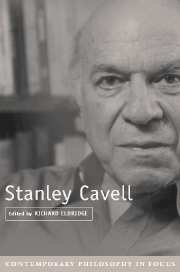Book contents
- Frontmatter
- Contents
- List of Contributors
- Stanley Cavell
- 1 Introduction: Between Acknowledgment and Avoidance
- 2 Stanley Cavell and Ethics
- 3 The Names of Action
- 4 Stanley Cavell's Vision of the Normativity of Language: Grammar, Criteria, and Rules
- 5 Aesthetics, Modernism, Literature: Cavell's Transformations of Philosophy
- 6 A Second Primavera: Cavell, German Philosophy, and Romanticism
- 7 Cavell on American Philosophy and the Idea of America
- 8 “Disowning Knowledge”: Cavell on Shakespeare
- 9 Cavell on Film, Television, and Opera
- Brief Annotated Bibliography of Works by and about Stanley Cavell
- Index
3 - The Names of Action
Published online by Cambridge University Press: 08 January 2010
- Frontmatter
- Contents
- List of Contributors
- Stanley Cavell
- 1 Introduction: Between Acknowledgment and Avoidance
- 2 Stanley Cavell and Ethics
- 3 The Names of Action
- 4 Stanley Cavell's Vision of the Normativity of Language: Grammar, Criteria, and Rules
- 5 Aesthetics, Modernism, Literature: Cavell's Transformations of Philosophy
- 6 A Second Primavera: Cavell, German Philosophy, and Romanticism
- 7 Cavell on American Philosophy and the Idea of America
- 8 “Disowning Knowledge”: Cavell on Shakespeare
- 9 Cavell on Film, Television, and Opera
- Brief Annotated Bibliography of Works by and about Stanley Cavell
- Index
Summary
We take some very simple action, like shoving a stone, usually as done by and viewed by oneself, and use this, with the features distinguishable in it, as our model in terms of which to talk about other actions: and we continue to do so, scarcely realizing it even when these other actions are pretty remote and perhaps much more interesting in their own right than the acts originally used in constructing the model ever were, and even when the model is really distorting the facts rather than helping us observe them.
J. L. Austin, “A Plea for Excuses”And thus the native hue of resolution
Is sicklied over with the pale cast of thought,
And enterprises of great pith and moment
With this regard their currents turn awry,
And lose the name of action.
Hamlet, III.i.86–90Almost anywhere you turn in the work of Stanley Cavell you will encounter some aspect of the problem of human action. What is it for human beings to act? What is it for us to be active rather than, for instance, passive or inactive? From Cavell's early defense of J. L. Austin to his latest remarks about Emerson and Nietzsche, Fred Astaire and Henry James, or Middlemarch and Macbeth, Cavell's investigations are twined around his interest in our capacity for being the origin of our actions and for bearing up under our vulnerability to accidents and inadvertancies and, indeed in our ability to make something out of these very inadvertancies and happenstances.
- Type
- Chapter
- Information
- Stanley Cavell , pp. 48 - 78Publisher: Cambridge University PressPrint publication year: 2003
- 2
- Cited by

